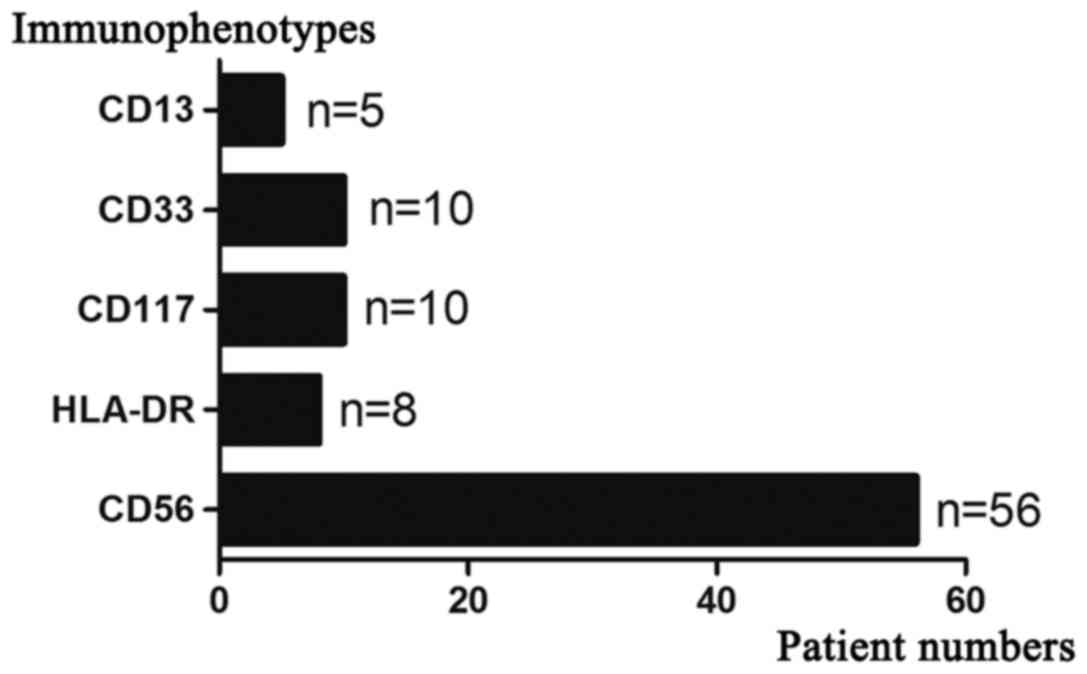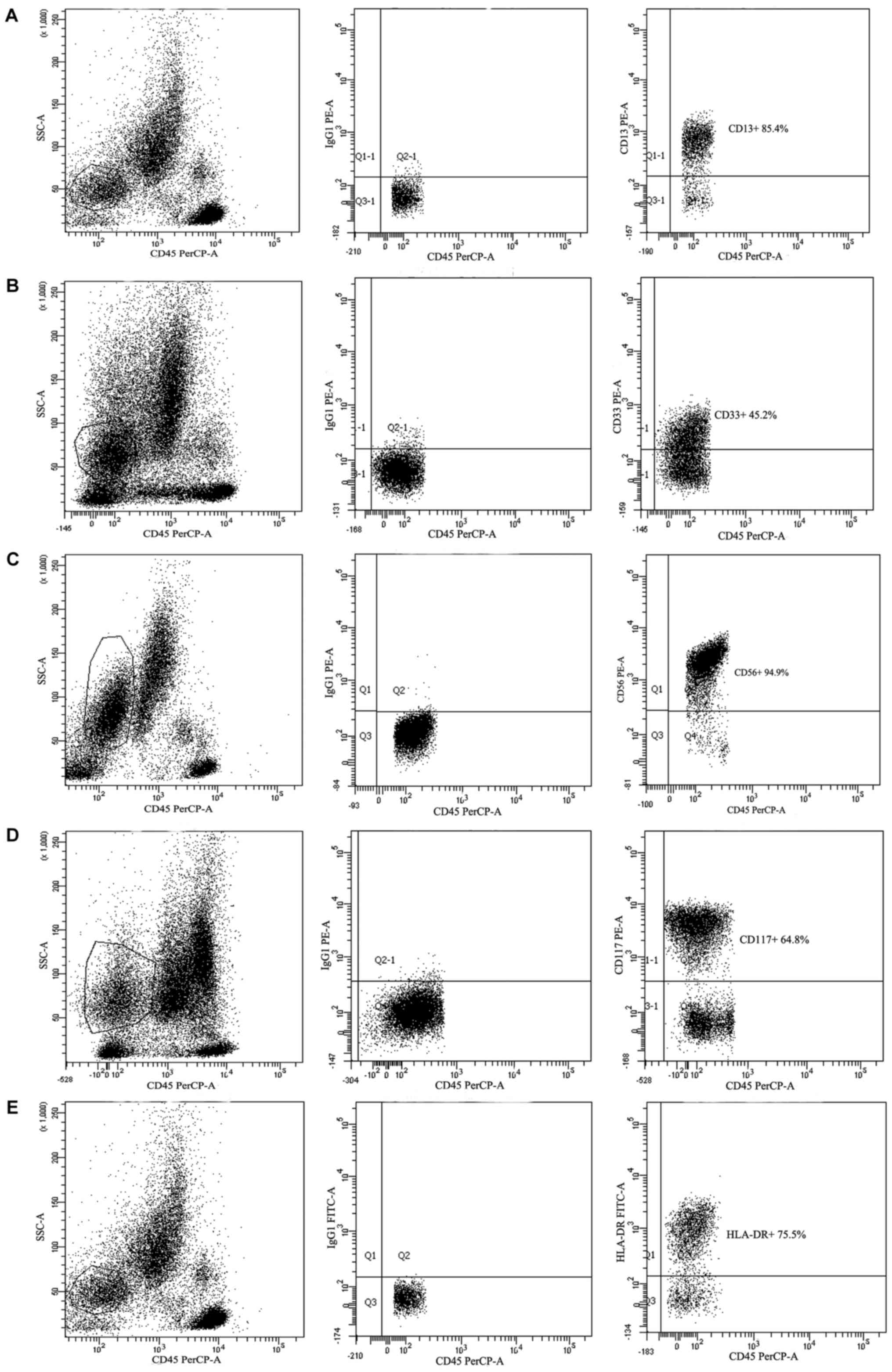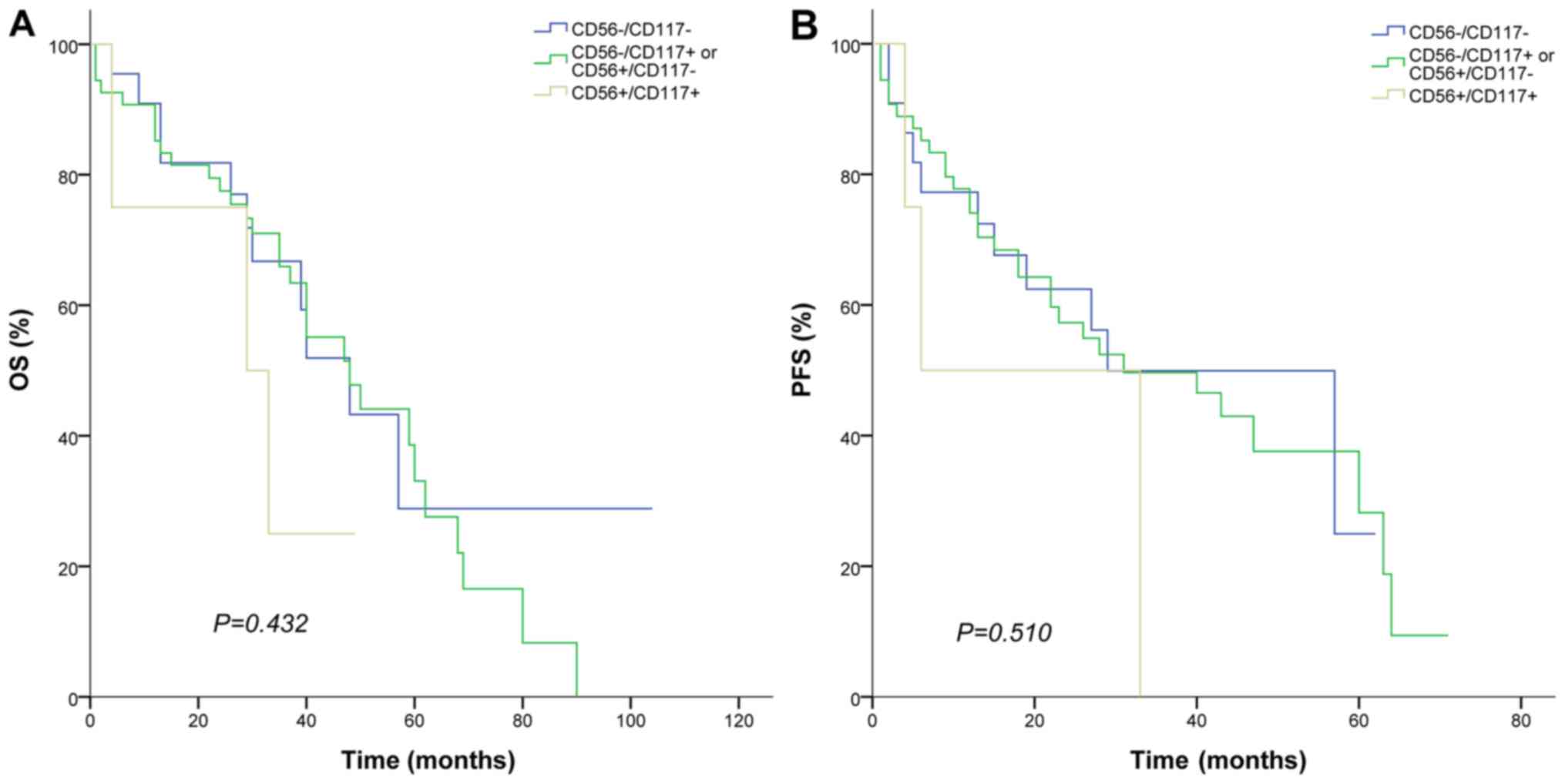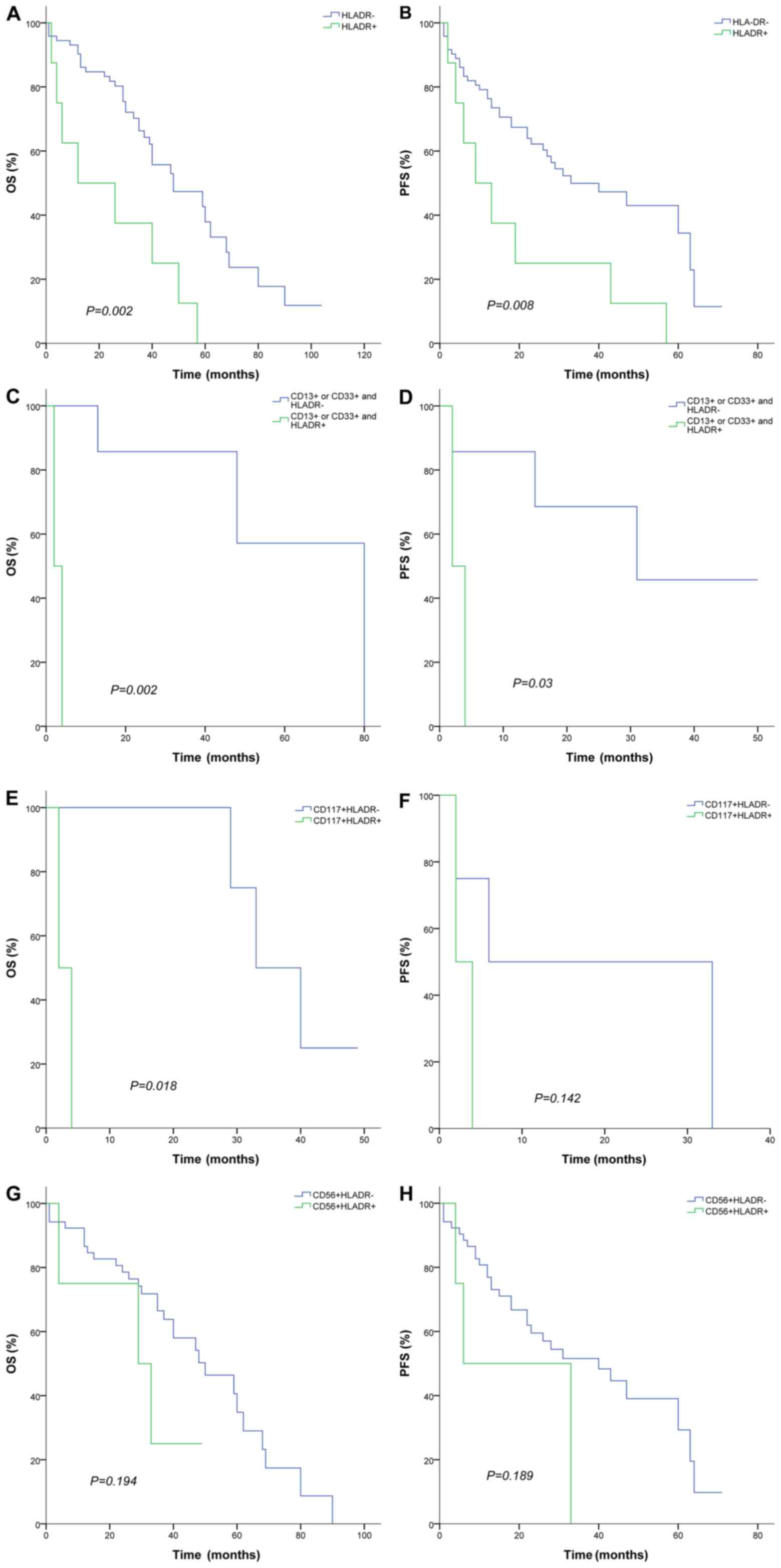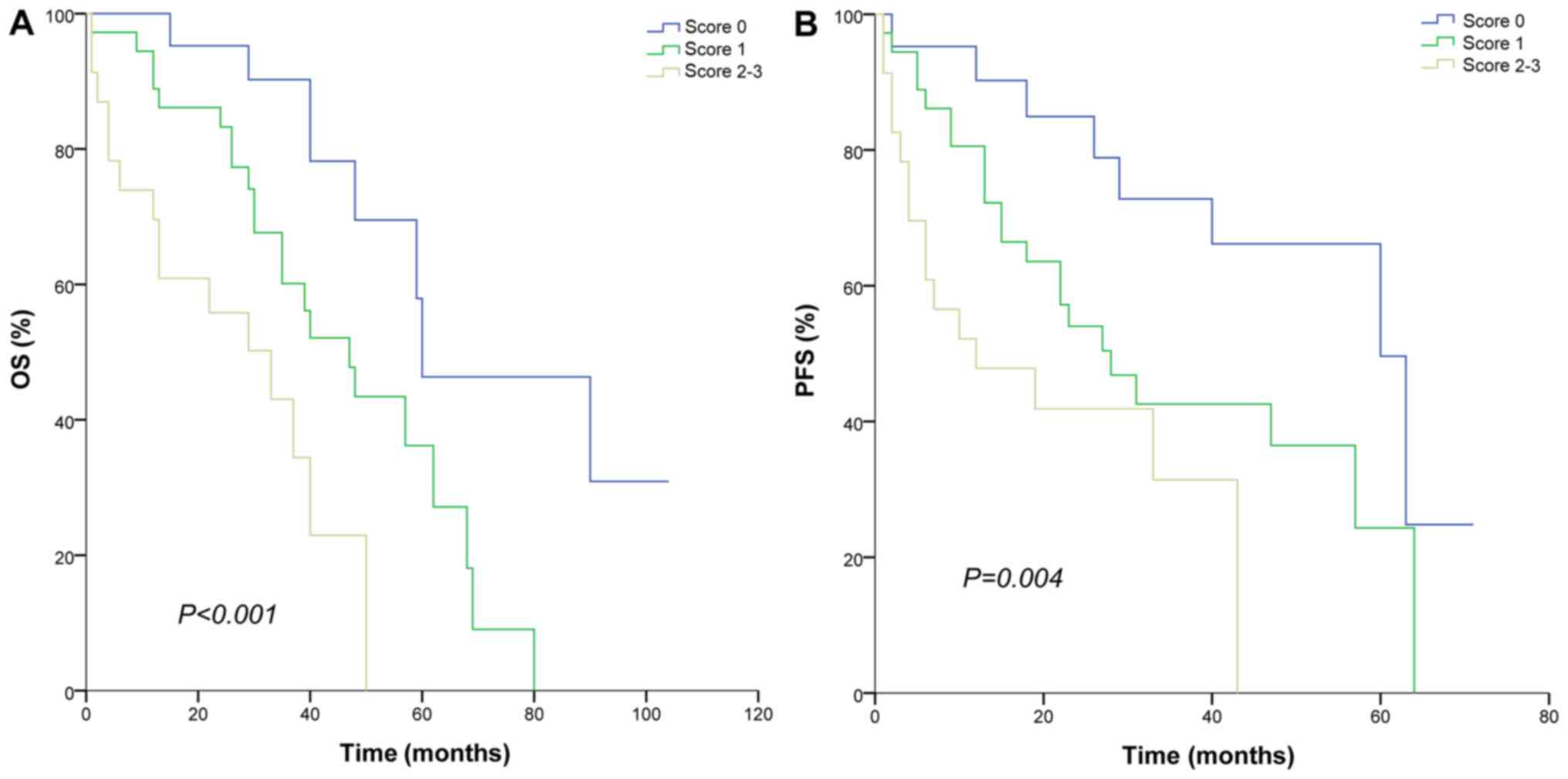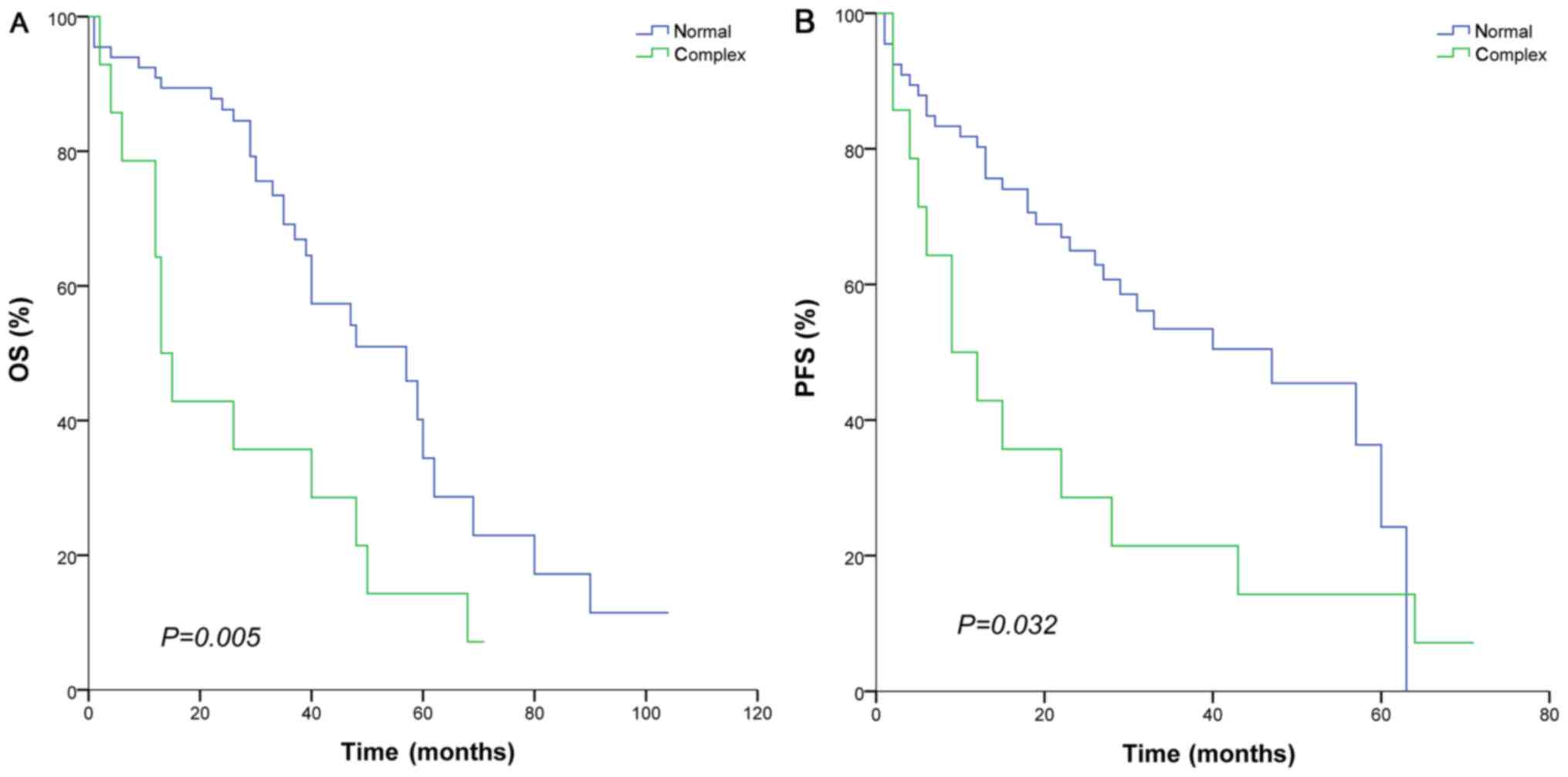|
1
|
Cejalvo MJ and de la Rubia J: Which
therapies will move to the front line for multiple myeloma? Expert
Rev Hematol. 10:383–392. 2017. View Article : Google Scholar : PubMed/NCBI
|
|
2
|
Palumbo A and Anderson K: Multiple
myeloma. N Engl J Med. 364:1046–1060. 2011. View Article : Google Scholar : PubMed/NCBI
|
|
3
|
Anderson KC, Alsina M, Bensinger W,
Biermann JS, Cohen AD, Devine S, Djulbegovic B, Faber EA Jr,
Gasparetto C, Hernandez-Illizaliturri F, et al: Multiple myeloma,
version 1.2013. J Natl Compr Canc Netw. 11:11–17. 2013. View Article : Google Scholar : PubMed/NCBI
|
|
4
|
Tadmor T: Do lymphocytes count in myeloma?
Are we absolutely sure? Leuk Lymphoma. 56:1193–1194. 2015.
View Article : Google Scholar : PubMed/NCBI
|
|
5
|
Kim DS, Yu ES, Kang KW, Lee SR, Park Y,
Sung HJ, Choi CW and Kim BS: Myeloma prognostic index at diagnosis
might be a prognostic marker in patients newly diagnosed with
multiple myeloma. Korean J Intern Med. 32:711–721. 2017. View Article : Google Scholar : PubMed/NCBI
|
|
6
|
Gertz MA and Buadi FK: Utility of
immunophenotyping of plasma cells in multiple myeloma. Leuk
Lymphoma. 28:1–2. 2015.
|
|
7
|
Li HQ and Zhai YP: Research progress on
multiple myeloma immunophenotyping and minimal residual disease
detected by flow cytometry. Zhongguo Shi Yan Xue Ye Xue Za Zhi.
23:241–245. 2015.(In Chinese). PubMed/NCBI
|
|
8
|
Pan Y, Wang H, Tao Q, Zhang C, Yang D, Qin
H, Xiong S, Tao L, Wu F, Zhang J and Zhai Z: Absence of both CD56
and CD117 expression on malignant plasma cells is related with a
poor prognosis in patients with newly diagnosed multiple myeloma.
Leuk Res. 40:77–82. 2016. View Article : Google Scholar : PubMed/NCBI
|
|
9
|
Ceran F, Falay M, Dagdas S and Ozet G: The
assessment of CD56 and CD117 expressions at the time of the
diagnosis in multiple myeloma patients. Turk J Haematol.
34:226–232. 2017.PubMed/NCBI
|
|
10
|
International Myeloma Working Group, .
Criteria for the classification of monoclonal gammopathies,
multiple myeloma and related disorders: A report of the
international myeloma working group. Br J Haematol. 121:749–757.
2003. View Article : Google Scholar : PubMed/NCBI
|
|
11
|
Greipp PR, San Miguel J, Durie BG, Crowley
JJ, Barlogie B, Blade J, Boccadoro M, Child JA, Avet-Loiseau H,
Kyle RA, et al: International staging system for multiple myeloma.
J Clin Oncol. 23:3412–3420. 2005. View Article : Google Scholar : PubMed/NCBI
|
|
12
|
Cavo M, Rajkumar SV, Palumbo A, Moreau P,
Orlowski R, Blade J, Sezer O, Ludwig H, Dimopoulos MA, Attal M, et
al: International Myeloma Working Group consensus approach to the
treatment of multiple myeloma patients who are candidates for
autologous stem cell transplantation. Blood. 117:6063–6073. 2011.
View Article : Google Scholar : PubMed/NCBI
|
|
13
|
Palumbo A, Rajkumar SV, San Miguel JF,
Larocca A, Niesvizky R, Morgan G, Landgren O, Hajek R, Einsele H,
Anderson KC, et al: International Myeloma Working Group consensus
statement for the management, treatment, and supportive care of
patients with myeloma not eligible for standard autologous
stem-cell transplantation. J Clin Oncol. 32:587–600. 2014.
View Article : Google Scholar : PubMed/NCBI
|
|
14
|
Durie BG, Harousseau JL, Miguel JS, Blade
J, Barlogie B, Anderson K, Gertz M, Dimopoulos M, Westin J,
Sonneveld P, et al: International uniform response criteria for
multiple myeloma. Leukemia. 20:1467–1473. 2006. View Article : Google Scholar : PubMed/NCBI
|
|
15
|
Palumbo A, Avet-Loiseau H, Oliva S,
Lokhorst HM, Goldschmidt H, Rosinol L, Richardson P, Caltagirone S,
Lahuerta JJ, Facon T, et al: Revised international staging system
for multiple myeloma: A Report From International Myeloma Working
Group. J Clin Oncol. 33:2863–2869. 2015. View Article : Google Scholar : PubMed/NCBI
|
|
16
|
Benboubker L, Dimopoulos MA, Dispenzieri
A, Catalano J, Belch AR, Cavo M, Pinto A, Weisel K, Ludwig H,
Bahlis N, et al: Lenalidomide and dexamethasone in
transplant-ineligible patients with myeloma. N Engl J Med.
371:906–917. 2014. View Article : Google Scholar : PubMed/NCBI
|
|
17
|
Gay F, Oliva S, Petrucci MT, Conticello C,
Catalano L, Corradini P, Siniscalchi A, Magarotto V, Pour L,
Carella A, et al: Chemotherapy plus lenalidomide versus autologous
transplantation, followed by lenalidomide plus prednisone versus
lenalidomide maintenance, in patients with multiple myeloma: A
randomised, multicentre, phase 3 trial. Lancet Oncol. 16:1617–1629.
2015. View Article : Google Scholar : PubMed/NCBI
|
|
18
|
Jimenez-Zepeda VH, Reece DE, Trudel S,
Chen C, Franke N, Winter A, Tiedemann R and Kukreti V: Absolute
lymphocyte count as predictor of overall survival for patients with
multiple myeloma treated with single autologous stem cell
transplant. Leuk Lymphoma. 56:2668–2673. 2015. View Article : Google Scholar : PubMed/NCBI
|
|
19
|
Suriu C, Akria L, Azoulay D, Shaoul E,
Barhoum M and Braester A: Absolute lymphocyte count as a prognostic
marker in newly diagnosed multiple myeloma patients. Int J Lab
Hematol. 38:e56–59. 2016. View Article : Google Scholar : PubMed/NCBI
|
|
20
|
Bataille R, Jego G, Robillard N,
Barille-Nion S, Harousseau JL, Moreau P, Amiot M and
Pellat-Deceunynck C: The phenotype of normal, reactive and
malignant plasma cells. Identification of ‘many and multiple
myelomas’ and of new targets for myeloma therapy. Haematologica.
91:1234–1240. 2006.PubMed/NCBI
|
|
21
|
Dahl IM, Rasmussen T, Kauric G and
Husebekk A: Differential expression of CD56 and CD44 in the
evolution of extramedullary myeloma. Br J Haematol. 116:273–277.
2002. View Article : Google Scholar : PubMed/NCBI
|
|
22
|
Bataille R, Pellat-Deceunynck C, Robillard
N, Avet-Loiseau H, Harousseau JL and Moreau P: CD117 (c-kit) is
aberrantly expressed in a subset of MGUS and multiple myeloma with
unexpectedly good prognosis. Leuk Res. 32:379–382. 2008. View Article : Google Scholar : PubMed/NCBI
|
|
23
|
Sahara N, Ohnishi K, Ono T, Sugimoto Y,
Kobayashi M, Takeshita K, Shigeno K, Nakamura S, Naito K, Tamashima
S, et al: Clinicopathological and prognostic characteristics of
CD33-positive multiple myeloma. Eur J Haematol. 77:14–18. 2006.
View Article : Google Scholar : PubMed/NCBI
|
|
24
|
Qiu Q, Zhu P, Wang MJ, Lu XZ, Dong YJ, Sun
YH, Wang LH, Zhang Y, Bu DF, Wang WS, et al: Expression of CD56 and
CD19 in patients with newly diagnosed multiple myeloma and their
relationship with karyotypes and prognosis. Zhongguo Shi Yan Xue Ye
Xue Za Zhi. 24:1071–1078. 2016.(In Chinese). PubMed/NCBI
|
|
25
|
Tang HL, Shu MM, Dong BX, Gu HT, Liang R,
Bai QX, Yang L, Zhang T, Gao GX and Chen XQ: Influence of CD117
expression on response of multiple myeloma patients to
chemotherapy. Zhongguo Shi Yan Xue Ye Xue Za Zhi. 23:1346–1351.
2015.(In Chinese). PubMed/NCBI
|
|
26
|
Mateo G, Montalban MA, Vidriales MB,
Lahuerta JJ, Mateos MV, Gutierrez N, Rosinol L, Montejano L, Blade
J, Martinez R, et al: Prognostic value of immunophenotyping in
multiple myeloma: A study by the PETHEMA/GEM cooperative study
groups on patients uniformly treated with high-dose therapy. J Clin
Oncol. 26:2737–2744. 2008. View Article : Google Scholar : PubMed/NCBI
|
|
27
|
Hundemer M, Klein U, Hose D, Raab MS,
Cremer FW, Jauch A, Benner A, Heiss C, Moos M, Ho AD and
Goldschmidt H: Lack of CD56 expression on myeloma cells is not a
marker for poor prognosis in patients treated by high-dose
chemotherapy and is associated with translocation t(11;14). Bone
Marrow Transplant. 40:1033–1037. 2007. View Article : Google Scholar : PubMed/NCBI
|
|
28
|
Complete sequence and gene map of a human
major histocompatibility complex. The MHC sequencing consortium.
Nature. 401:921–923. 1999. View
Article : Google Scholar : PubMed/NCBI
|
|
29
|
Hasan ZN, Zalzala HH, Mohammedsalih HR,
Mahdi BM, Abid LA, Shakir ZN and Fadhel MJ: Association between
human leukocyteantigen-DR and demylinating Guillain-Barre syndrome.
Neurosciences. 19:301–305. 2014.PubMed/NCBI
|
|
30
|
Nada AM and Hammouda M: Immunoregulatory T
cells, LFA-3 and HLA-DR in autoimmune thyroid diseases. Indian J
Endocrinol Metab. 18:574–581. 2014. View Article : Google Scholar : PubMed/NCBI
|
|
31
|
Diao J, Xia T, Zhao H, Liu J, Li B and
Zhang Z: Overexpression of HLA-DR is associated with prognosis of
glioma patients. Int J Clin Exp Pathol. 8:5485–5490.
2015.PubMed/NCBI
|
|
32
|
Sconocchia G, Eppenberger-Castori S,
Zlobec I, Karamitopoulou E, Arriga R, Coppola A, Caratelli S,
Spagnoli GC, Lauro D, Lugli A, et al: HLA class II antigen
expression in colorectal carcinoma tumors as a favorable prognostic
marker. Neoplasia. 16:31–42. 2014. View Article : Google Scholar : PubMed/NCBI
|
|
33
|
Rimsza LM, Leblanc ML, Unger JM, Miller
TP, Grogan TM, Persky DO, Martel RR, Sabalos CM, Seligmann B,
Braziel RM, et al: Gene expression predicts overall survival in
paraffin-embedded tissues of diffuse large B-cell lymphoma treated
with R-CHOP. Blood. 112:3425–3433. 2008. View Article : Google Scholar : PubMed/NCBI
|
|
34
|
Yamamoto W, Nakamura N, Tomita N, Takeuchi
K, Ishii Y, Takahashi H, Watanabe R, Takasaki H, Motomura S,
Kobayashi S, et al: Human leukocyte antigen-DR expression on flow
cytometry and tumor-associated macrophages in diffuse large B-cell
lymphoma treated by rituximab, cyclophosphamide, doxorubicin,
vincristine and prednisone therapy: Retrospective cohort study.
Leuk Lymphoma. 55:2721–2727. 2014. View Article : Google Scholar : PubMed/NCBI
|
|
35
|
Nemec P, Zemanova Z, Kuglik P, Michalova
K, Tajtlova J, Kaisarova P, Oltova A, Filkova H, Holzerova M,
Balcarkova J, et al: Complex karyotype and translocation t(4;14)
define patients with high-risk newly diagnosed multiple myeloma:
Results of CMG2002 trial. Leuk Lymphoma. 53:920–927. 2012.
View Article : Google Scholar : PubMed/NCBI
|
|
36
|
Chen SY: Clinical effect of bortezomib
combined with dexamethasone and thalidomide on treatment of
multiple myeloma. J Clin Med Practice. 18:1–126. 2014.
|















